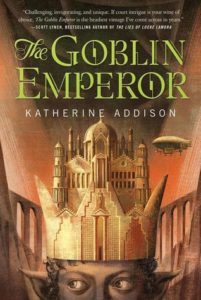
In my corners of book social media, it’s impossible not to be aware of Katherine Addison’s breakout hit, The Goblin Emperor, which is either a delightfully wholesome comfort read or a dull political fantasy where nothing happens, depending on who you ask. It had been on my list for a long time, and after finally getting to it, I both understand the debate and find it a bit misguided.
The Goblin Emperor stars Maia, the disfavored half-goblin son of the Emperor of the Elflands and his unloved fourth wife, whose de facto exile in a forgotten manor in the western marshlands ends when he receives news that his father and all of his brothers have died in an airship accident. And so he must travel to a hostile and unfamiliar elvish court and learn to rule.
The Goblin Emperor is sold as political intrigue, and while there is certainly plenty of politics, it’s a fish-out-of-water story at heart. Maia has not been trained to navigate the political waters of the court, and he rises to power not even knowing the names of the key players, many of whom are seeking to undermine him at every turn. This gives him a perspective distinct from the dominant opinions of the rest of the nobility, with an empathy for the forgotten that comes from hard experience. But it also generally precludes him from direct action–despite his power as Emperor, his advisors must explain significant events and correspondences to someone who knows neither the people nor the significance. And when Maia wishes to act, he must pass instructions to advisors who are prepared to handle the details.
This deeply reinforces Maia’s isolation, two steps removed from every action and in a position of power that makes it difficult to form honest relationships. At the same time, it makes him extremely sympathetic to a modern reader who is also unfamiliar with elvish court politics and will also readily decry prejudice based on racial identity. But it also means that almost everything is told instead of shown, and at nearly 500 pages, it’s a lot of explanation of unfamiliar politics punctuated but not very much direct action. A lot happens in this book, but Maia’s distance and the reader’s corresponding distance often makes it feel otherwise, leading to the perception of uneventfulness cited by its critics.
Addison nails every nuance of the world-building, from gendered names that don’t match well with English to use of formal pronouns (“we” and “you”) which are distinguished as needed from simple plurals (which may also be rendered “we” in English) to the intricacies of various titles and their significance. All of it makes the world feel real while making the reader feel like an outsider. Couple that with successfully drawing a sympathetic main character and writing a plot that makes his successes difficult and worthy of cheering, and it’s easy to see why The Goblin Emperor garnered such rave reviews. But at the same time, it felt like too much of what it was. The reader’s distance is clearly an intentional stylistic choice, and it certainly didn’t stop me from engaging early and late. But there was so much filtering through advisors that the narrative dragged from long stretches in the middle. I suspect the style of storytelling would’ve been wonderful in a 300-page novel, but it didn’t fit a 480-page novel. And so, for all that was done so well, I did not join the legion of Goblin Emperor aficionados.
Recommended if you like: fish-out-of-water stories, sympathetic characters working to change an unkind and alienating world.
Overall rating: 13 of Tar Vol’s 20. Three stars on Goodreads.
